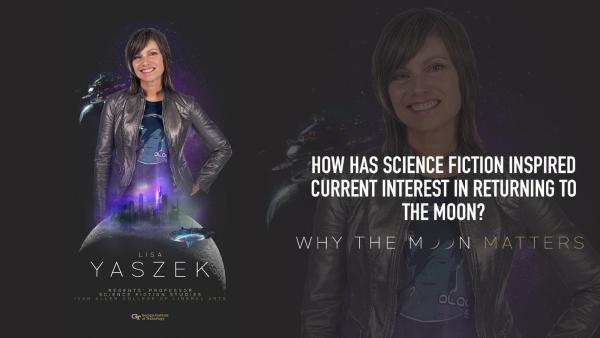Sci-Fi TV Is in Its Golden Age: What You Need to Know Now
Newsday
Lisa Yaszek (Literature, Media, and Communication)
https://www.newsday.com/entertainment/tv/science-fiction-netflix-apple-star-tre…

Regents’ Professor
School of Literature, Media, and Communication Ivan Allen College of Liberal Arts
Lisa Yaszek is a leading scholar and commentator in the field of science fiction literature, particularly its history, cultural implications, and underrepresented voices in the genre, including women and people of color.
Lisa Yaszek researches and teaches science fiction as a global language crossing centuries, continents, and cultures. Yaszek’s books include The Future is Female! Volumes 1 and 2 (Library of America, 2018 and 2022); Literary Afrofuturism in the Twenty-First Century (OSUP, 2020); Sisters of Tomorrow: The First Women of Science Fiction (Wesleyan, 2016); The Self-Wired: Technology and Subjectivity in Contemporary American Narrative (Routledge 2002/2014); and Galactic Suburbia: Recovering Women’s Science Fiction (Ohio State, 2008). Her ideas about science fiction as the premier story form of modernity have been featured in The Washington Post, Food and Wine Magazine, and USA Today and on the AMC miniseries, James Cameron's Story of Science Fiction. A past president of the Science Fiction Research Association, Yaszek currently serves as an editor for the Library of America and as a juror for the Phillip K. Dick, John W. Campbell, and Eugie Foster Science Fiction Awards.
Newsday
Lisa Yaszek (Literature, Media, and Communication)
https://www.newsday.com/entertainment/tv/science-fiction-netflix-apple-star-tre…
Time
Lisa Yaszek, LMC
https://www.washingtonpost.com/technology/2023/01/11/science-fiction-space-trav…
WABE
Georgia Tech professors Dr. Susana Morris and Dr. Lisa Yaszek discuss Afrofuturism and the role of women in the new Blank Panther film, “Wakanda Forever.”
https://www.wabe.org/podcasts/city-lights/afrofuturism-and-the-role-of-women-in…

Lisa Yaszek, a regents professor in the School of Literature, Media, and Communication, was quoted in the article, 'Black History Month: How Octavia Butler's Legacy Was Born out of a Bad Science-Fiction Movie', published on February 23, 2022 in USA Today.
An excerpt:
"She was literally one of the first, if not the first, Black woman to publish in modern science fiction magazines under own name," Lisa Yaszek, regents professor of science fiction studies in the School of Literature, Media and Communication at Georgia Tech told USA TODAY last year.
https://www.usatoday.com/story/entertainment/books/2022/02/23/octavia-butler-wh…
Roswell Biotechnologies
Lisa Yaszek, Regents Professor in the School of Literature, Media, and Communication, was interviewed for "Exploring the Boundaries of Time Travel," which aired May 30, 2021, on CBS News Sunday Morning.
The story discussed the historical origins of time-travel stories and whether time travel is scientifically feasible.
Excerpt:
The idea of time travel is actually as old as civiliaztion itself, and we see the very first stories in the Mahabharata, the great Indian epic, in 400 B.C.E, so they are nearly 2500 years old.
As we moved into an industrial culture, and suddenly we had trains that had to move on schedule from station to station, and ships that had to cross great bodies of water and make it into docks at cetain times, we had to make sure that humans in different parts of the world were telling time in the same waus. And I think that was really exciting. We felt like we suddenly did have a little control over time.
https://www.cbsnews.com/video/exploring-the-boundaries-of-time-travel/
NIH Director's Pioneer Award
LMC Professor Lisa Yaszek’s insights about solar eclipses in science, fiction, and culture were the focus of the article of “Solar Eclipses Have Been a Science Fiction Theme for Thousands of Years: How Storytellers throughout History Have Used the Phenomenon to Portray Terror, Emotional Stakes, and More” in Vox Media.
Excerpt:
As millions of Americans prepare to witness the first total solar eclipse in the U.S .in 38 years, I turned to Lisa Yaszek, a professor in the School of Literature, Media, and Communication at Georgia Tech University and former president of the Science Fiction Research Association, to discuss the history, meanings, and accuracy of eclipses in fiction. Here’s what I learned.
The following interview has been lightly edited for length and clarity.
What are the key scientific aspects of a solar eclipse that must be present for an accurate depiction?
In the case of a solar eclipse on Earth, authors and directors want to make sure they get all the heavenly objects in question lined up, and that it’s clear the moon is between the sun and the Earth. They also want to make sure they’ve got a duration that makes sense. Solar eclipses usually last just a few minutes, while lunar eclipses can go on for hours.
Read full article
https://www.vox.com/culture/2017/8/18/16158544/solar-eclipses-science-fiction